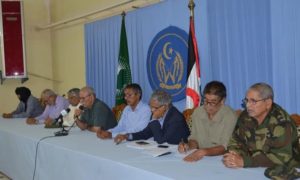 The Polisario leadership admitted, for the first time, their failure in the management of the Sahara issue, acknowledging that they had committed “fatal errors” since the signing of the ceasefire agreement in September 1991 until the “Battle of Guerguerat”, going through the 1995 negotiations on the buffer zone.
The Polisario leadership admitted, for the first time, their failure in the management of the Sahara issue, acknowledging that they had committed “fatal errors” since the signing of the ceasefire agreement in September 1991 until the “Battle of Guerguerat”, going through the 1995 negotiations on the buffer zone.
This came in an internal document, classified as confidential, that was distributed to Polisario senior executives. However, the Front leaders have deliberately leaked the document to the press in an attempt to whitewash the new chief of the Polisario Brahim Ghali and to impute responsibility for these failures to his predecessor, Mohamed Abdelaziz, who died on 31 May 2016.
In the aftermath of the forced withdrawal of its militiamen from the buffer zone of Guerguerat, the Polisario leaders, who had sworn a few days earlier never to leave this region, spoke in a statement of “redeployment” instead of “withdrawal” of the militiamen, to mitigate the extent of their defeat, comments a website close to the Polisario Front.
The confidential document alludes to resolution 2351 adopted by the Security Council at the end of April, a strong-worded text that left to the Polisario leaders and their Algerian mentors no room for maneuver.
According to the document, “the decision to withdraw from Guerguerat was made in response to a request from allies who argued that the continued presence of the Polisario in the strip would have a reverse effect” and would constitute a “political suicide” for the Polisario, especially after Morocco’s unilateral withdrawal on February 26, 2017.
The Polisario also acknowledges in its document that it committed “fatal errors” in negotiating the September 1991 ceasefire agreement and the supplementary agreements of September 24, 1997, which set out the technical modalities of the buffer zones.
The front blamed itself for not insisting on the establishment of a control post under the MINURSO monitoring at the level of the strip separating the Guerguerat region from the town of Lagouira. Today, Polisario militiamen need a Mauritanian pass to go to this region.
The Polisario eventually acknowledges its blatant failure in the management of the Sahara issue without going into details of the latest setbacks it suffered both at the UN and on the African diplomatic scene.
Actually, Morocco made a triumphant return within the African Union, combined with a remarkable and unprecedented rapprochement with African countries, including with former allies of the Polisario.
In making these revelations, the Polisario marks a break with the triumphalist speeches it used to clamor for propaganda needs.